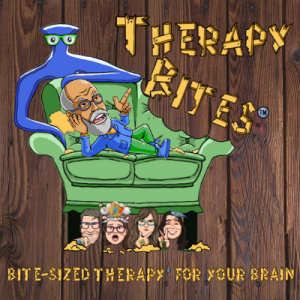
Thursday Nov 24, 2022
E12. Attitude of Gratitude: The Psychology of Thanksgiving
Attitude of Gratitude: The Psychology of Thanksgiving
Audience: Master catastrophizers, chronic complainers, & professional pessimists, but also those who have experienced difficult, or even tragic, events and struggle with reasons to be grateful.
Psychotherapy Adventurers: Gamer Girl Heather (grateful for opposable thumbs), Super Bookworm Sarah (grateful for her optic nerves), Squirrel Girl Debbie (grateful for furry friends), & Doc Heath; who has so many things for which to be grateful but about which he often UNDER-thinks! He is practicing DAILY his own TFG’s (Targets for Gratefulness) & encourages you to join in.
Go to https://TherapyBites.myshopify.com & grab some A.R.T. LAB MERCH, specially designed to help keep this episode’s message “top of mind” in your life! Don’t forget friends & family members who could use a mental boost too.
Show Summary: In this episode . . .
TherapyBites Podcast is the home of A.R.T. LAB which investigates, explores, & educates all about the neuroscience of Accurate, Realistic Thoughts & Life Affirming Beliefs by challenging worn-out, unsubstantiated, ivory tower psychological theories as well as kool-aid drinking, pseudo-psychological, social media mumbo-jumbo clap-trap.
Today we venture beyond the typical T-Day TurkeyTalk to delve deeper into a study of the benefits of the practice of “Thanksgiving” from a neuroscience perspective. We hope to motivate YOUR engagement in a regular practice of gratitude by identifying specific ‘Targets for Gratefulness’ (TFG’s).
One of the healthiest neuroscience-based training exercises is the identification of “Targets for Gratefulness” (TFG).
Once identified, we can utilize mindfulness techniques (please join in & follow our Mindful Good Morning posts) to explore various aspects of gratefulness in relation to a targeted event, situation, circumstance, person, object, thought, or realization. This can be in relation to ourselves, others, or the universe around us.
1) CHOOSE a Target for Gratefulness (TFG).
2) EXPLORE overlooked aspects of your TFG.
3) BREATHE as you become MINDFUL of these often overlooked facets of life.
4) AGREE with yourself to continue being mindful of this gratitude focus as you prepare your evening meal, as you enjoy each bite of food, as you spend time with yourself or others significant to you.
5) REALIZE that gratitude, like oxygen, may be breathed in and out, sharing with others in our own personal orbit. Gratitude cultivates relationships, improves physical and mental health including immune function, & engineers greater levels of empathy/perspective-taking. Gratitude reduces inaccurate, unrealistic thoughts (IUTy’s), promotes sleep hygiene, & builds resilience.
6) SHARE your TFG in the comments below. We can all benefit from one another’s experiences.
Gratefulness can add value AND meaning to YOUR human experiences & relationships. Join us on today’s episode as we bite into the science of GRATITUDE and give YOUR “BGC Neurons” a much needed vacation.
Visit the TBAL Team at: https://therapybites.ac-page.com/team
CLICK BELOW FOR DAILY LIFE-AFFIRMING, PSYCHOLOGICALLY NUTRITIOUS INFO:
YouTube: https://www.youtube.com/channel/UC9Y8hab2i3m3YTqO9I7Rcjg
Instagram: https://www.instagram.com/doc.heath/
TikTok: https://www.tiktok.com/@therapy_bites
Twitter: https://twitter.com/therapy_bites
Tumblr: https://www.tumblr.com/therapy-bites
Pinterest: https://www.pinterest.com/Therapy_Bites/
Facebook: https://www.facebook.com/TherapyBitesPodcast/
(We love YOUR questions & comments on our social pages)
For the full show notes, visit https://therapybites.podbean.com/e/gratitude
USEFUL REFERENCES:
Davis, D. E., Choe, E., Meyers, J., Wade, N., Varjas, K., Gifford, A., ... & Worthington Jr, E. L. (2016). Thankful for the little things: A meta-analysis of gratitude interventions. Journal of counseling psychology, 63(1), 20.
Emmons, R. A., & Stern, R. (2013). Gratitude as a psychotherapeutic intervention. Journal of clinical psychology, 69(8), 846-855.
Kerr, S. L., O’Donovan, A., & Pepping, C. A. (2015). Can gratitude and kindness interventions enhance well-being in a clinical sample?. Journal of Happiness Studies, 16(1), 17-36.
FOR OUR VORACIOUS READERS . . . GOBBLE UP THE WHOLE THING!!! (transcript): https://docs.google.com/document/d/11TU9IlhwBX_Q_6_EaPsUbfhCEWIZjdr9vAIhnY9PECU/edit?usp=sharing